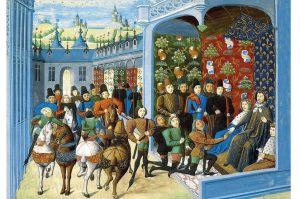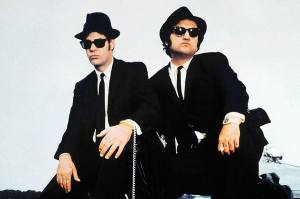There aren’t many authors as generous to their readers as David Mitchell. Ever since Ghostwritten in 1999, he’s specialized in big novels bursting with storytelling in all kinds of genres — most famously Cloud Atlas, where six very different novellas were immaculately intertwined. Not only that but, as he’s said, ‘each of my books is one chapter in a sort of sprawling macro-novel’, with many of the same characters and events being either updated or given fuller backstories.
At its best, this generosity has resulted in some of the most lavishly satisfying fiction of recent times. Occasionally, though, it can feel rather like the type shown by Mrs Doyle in Father Ted, with Mitchell refusing to take no for an answer as he forces more and more would-be treats on his already sated readers.
In 2014’s The Bone Clocks, for example, Mitchell’s strange fondness for the transmigration of souls as a narrative device was given a backstory of particularly punishing and increasingly silly thoroughness. The climax came in a full-scale showdown between two kinds of immortal beings: the virtuous Horologists, who achieve immortality by means of their souls entering and reanimating naturally deceased children, and the villainous Anchorites — who achieve it by killing ‘engifted’ children and drinking their souls. (Sample sentence from the showdown: ‘Incorporeally, I pour psychovoltage into a neurobolas and kinetic it at our assailants.’) Worse still, The Bone Clocks was swiftly followed by Slade House in which the Anchorite-Horologist struggle was explained even more painstakingly.
Which is why Utopia Avenue, Mitchell’s first novel since then, comes as a such a relief. True, it does feature one soul that’s migrated enough to require Horologist intervention — and possibly to baffle anyone who hasn’t read his previous fiction. But happily this is only one element in a book bristling with pleasures from the more traditional side of his palette.
The title refers to a rock band assembled in London in 1967 by its manager Levon Frankland, whom we last saw briefly reminiscing about the very same band in a 2015 scene from The Bone Clocks. (Mitchell really does plan ahead, it seems.) The rhythm section consists of drummer ‘Griff’ Griffin from Hull and bassist Dean Moss who grew up in Gravesend — where some of the more uncomplicated parts of The Bone Clocks took place in the 1980s and are duly foreshadowed here. Representing the middle classes are keyboardist Elf Holloway, a female folkie, and guitar virtuoso Jasper de Zoet, who — as his name and Mitchell’s past form might indicate — is a descendant of the eponymous Dutch shipping clerk in 18th-century Japan from 2010’s The Thousand Autumns of Jacob de Zoet.
Sure enough, Jasper has a migrated soul from that time buried inside his brain — although to understand that he’s not schizophrenic, or why he has disturbing visions of an 18th-century Japanese abbot, or basically what on earth’s going on, it helps to have read not just The Thousand Autumns and The Bone Clocks, but also a section in Ghostwritten narrated by a Mongolian ‘noncorpum’.
In fact, if you have, Jasper’s story becomes quite intriguing. Yet, there’s something slightly dutiful about it too, as if the cosmology that Mitchell has so patiently created is something he (mistakenly) believes his readers would miss if it didn’t underpin everything he writes.
Meanwhile, the other band members are given their own, more straightforward and ultimately more affecting, adventures. Both Mitchell and the reader have a lot of fun as well, with walk-on parts from any number of real-life musicians: a pre-fame David Bowie pinning his hopes on a piece of ‘vaudeville psychedelia’ called ‘The Laughing Gnome’; an anxious Brian Jones fearing that he’s being sidelined by his fellow Rolling Stones; Marc Bolan behaving like a rock star long before he became one.
[special_offer]
Meeting Dean in LA, Frank Zappa delivers the celebrated line that ‘writing about music is like dancing about architecture’ — but, as it turns out, Mitchell can do that too, infectiously capturing the band’s elation as a song comes together. He also proves again how good he is at set-pieces. In London, the gay Levon has a memorable and very long night out with Francis Bacon. In New York, the band party at the Chelsea Hotel with Leonard Cohen and Janis Joplin in a scene that reminds us how thrilling America must have seemed to post-war Brits.
Taken individually, many of the set-pieces (and the novel mostly comprises them) seem like the old David Mitchell back telling stories purely for their own exhilarating sake. Yet, between them, they gradually add up to an overwhelmingly vivid — and equally exhilarating — portrait of an era when the future seemed likely to be shaped by a combination of young people and music. At the same time, there’s a melancholy sense of the transience of this idealism, which is already beginning to curdle by late 1968.
Of course, these are not especially original insights into the 1960s. But then again, original thoughts have always taken second place in Mitchell’s work to his highly original ways of expressing them. (After all its pyrotechnics, the author’s message in Cloud Atlas was essentially that love is better than hate.) So it is that Utopia Avenue confirms that his real talent — perhaps even genius — lies in finding wildly entertaining new ways to tell old truths. All we need now, I would suggest, is that he gives the Horologists the next book off…
This article was originally published in The Spectator’s UK magazine. Subscribe to the US edition here.


















